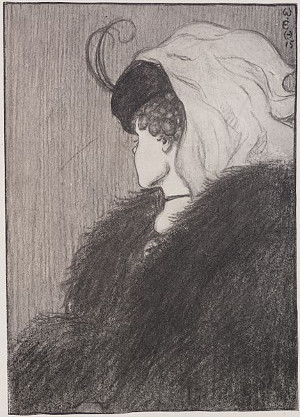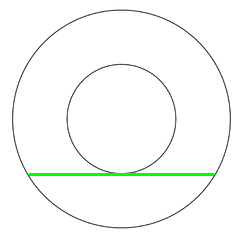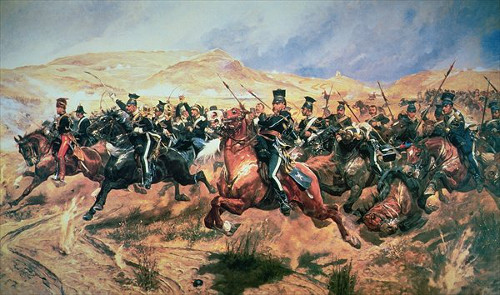
pentheraphobia
n. fear of one’s mother-in-law
Above: “My Wife and My Mother-in-Law,” from Puck, November 1915.
Asked what was the maximum punishment for bigamy, Lord Russell of Killowen said, “Two mothers-in-law.”

pentheraphobia
n. fear of one’s mother-in-law
Above: “My Wife and My Mother-in-Law,” from Puck, November 1915.
Asked what was the maximum punishment for bigamy, Lord Russell of Killowen said, “Two mothers-in-law.”
At a certain moment yesterday evening I coughed and at a certain moment yesterday I went to bed. It was therefore true on Saturday that on Sunday I would cough at the one moment and go to bed at the other. … But if it was true beforehand … that I was to cough and go to bed at those two moments on Sunday, 25 January 1953, then it was impossible for me not to do so.
— Gilbert Ryle, Dilemmas, 1954

A carnival worker is asked to paint the deck of a carousel. Because the center of the carousel is occupied by machinery, he can’t measure its diameter or even its radius. The best he can do is to take the measurement shown in green, which is 42 feet.
He’s explaining this apologetically when his supervisor stops him. “That’s all the information we need,” he says. “That’s enough to tell us how much paint to buy.”
How did they go about it?
Passages from the writings of Amanda McKittrick Ros (1860-1939), widely considered the worst novelist of all time:
Here’s a full novel. “She cannot be altogether laughed off,” wrote Anthony Powell. “She may be a long way from Shakespeare, but she partakes, in however infinitely minute a degree, of the Shakespearean power over language.” Ros herself had written, “I expect I will be talked about at the end of 1000 years.” She may have been right.

I want now to introduce another case — the case of a young officer in the cavalry who was killed in the charge of the Light Brigade. This officer was among the leaders of the charge and was shot quite early by a soldier named Ivan. Suppose that, had he not been shot by Ivan, he would have been killed within a few seconds by a bullet fired by Boris, who also had him within his sights. Our natural response to this case is to say that the officer’s death was a grave misfortune, depriving him of many years of life. Yet … should we not also conclude that in this case all the officer lost in being shot by Ivan was a few seconds of life, so that his death was hardly a misfortune at all?
— Jeff McMahan, “Death and the Value of Life,” Ethics, October 1988
Alice gets a rocket-powered pogo stick for her birthday. She jumps 1 foot on the first hop, 2 feet on the second, then 4, 8, and so on. This gets alarming. By judicious hopping, can she arrange to return to her starting point?

In 1902, disgusted with the “characteristic American custom of promiscuous, unsought and unauthorized introductions,” Ambrose Bierce proposed a new social convention — disintroductions:
Mr. White–Mr. Black, knowing the low esteem in which you hold each other, I have the honor to disintroduce you from Mr. Green.
Mr. Black (bowing)–Sir, I have long desired the advantage of your unacquaintance.
Mr. Green (bowing)–Charmed to unmeet you, sir. Our acquaintance (the work of a most inconsiderate and unworthy person) has distressed me beyond expression. We are greatly indebted to our good friend here for his tact in repairing the mischance.
Mr. White–Thank you. I’m sure you will become very good strangers.
“This is only the ghost of a suggestion,” Bierce wrote. “Of course the plan is capable of an infinite elaboration. Its capital defect is that the persons who are now so liberal with their unwelcome introductions, will be equally lavish with their disintroductions, and will estrange the best of friends with as little ceremony as they now observe in their more fiendish work.”

You’re alone on a desert island and want to lay out a course for some snail races. Unfortunately, you have only an 8.5 x 11 inch sheet of paper. How can you use it to measure exactly 3 inches?
On Tuesday week, as the coal train on the Swannington line was proceeding to Leicester, and when near Glenfield, the engine-driver suddenly perceived a fine bullock appear on the line, and turn to meet the train, head to head with the engine. The animal ran directly up to its fiery antagonist, and by the contact was killed on the spot. There was no time to stop the train before the infuriated beast came up. It was afterwards discovered that the animal belonged to Mr. Hassell, of Glenfield, and made its way on to the line from the field adjoining.
— Leicester Journal, reprinted in the Times, Aug. 10, 1849